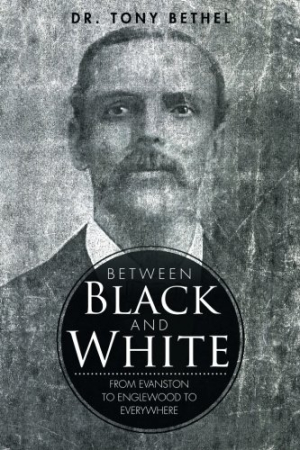Between Black and White
From Evanston to Englewood to Everywhere
This memoir digs into questions of racism and what exactly constitutes “blackness.”
Tony Bethel, a doctor of naprapathic medicine, writes about being a descendant of the Bethels, a mixed-race family with enslaved ancestors, in Between Black and White. The Bethels moved from North Carolina to Tennessee, where his great-grandfather built the Covington courthouse. With such a prominent family, the author was determined to succeed, and his experiences reveal a life plagued by questions of heritage, racial identity, and purpose.
The book begins with more of a genealogical focus fueled by Bethel’s curiosity about the origins of his great-great-great-grandmother Nidra’s name. How did a slave from Africa get a Hindu name? This burning question sparks an insatiable interest in family history. Other driving questions are hinted at, such as whether the author, a child from an affair that ends in marriage, is truly embraced as a Bethel, both in his own psyche and externally by his family and the community. His recollections of summers spent with half siblings during visits with their father in Chicago indicate that he was.
Throughout the rest of the book, Bethel turns to an autobiographical approach, describing key events from childhood to the present, often with a choppy pace, offering a list of details and circumstances in his life with little narrative flow. The fundamental questions in this part of the book are, who am I? and, what do I want to do with my life?
With each success, Bethel is careful to point out that he did not endure racism, which signals another question that looms a little larger than his others: What does race really mean in our society? More specifically, what constitutes blackness? Bethel writes, “When I think of all this, I wonder, are we what we are by genetics, socialization, or both?” A considerable amount of time is spent puzzling over this in a rather haphazard manner. For example, in the book, blackness is decidedly a social construct, yet whiteness is not given similar treatment. Several times it is suggested that when black people, particularly the author, his father, and his great-grandfather, are respected and accepted by whites, they reach the esteemed position of being between black and white. While some will find these ideas problematic, others might conclude the author’s views resonate with their own.
Those interested in stories with goal-oriented heroes set on following their passion despite obstacles and heartache will enjoy this book.
Reviewed by
Kaavonia Hinton
Disclosure: This article is not an endorsement, but a review. The publisher of this book provided free copies of the book and paid a small fee to have their book reviewed by a professional reviewer. Foreword Reviews and Clarion Reviews make no guarantee that the publisher will receive a positive review. Foreword Magazine, Inc. is disclosing this in accordance with the Federal Trade Commission’s 16 CFR, Part 255.

